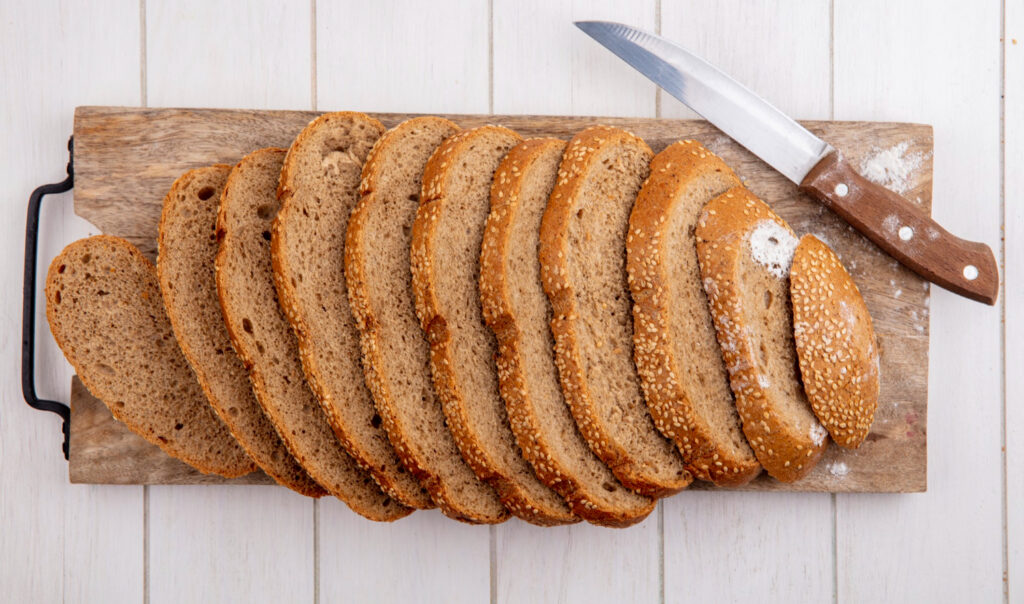
In this article
Ezekiel bread, made from sprouted whole grains and legumes, stands out as a low-calorie, high-fiber, and high-protein option compared to traditional white bread. It’s often hailed as the “holy grail” of breads, but does it truly live up to the hype? Registered dietitian Kayla Kopp, RD, LD, explains the benefits, uses, and storage of Ezekiel bread.
What is Ezekiel Bread?
Ezekiel bread is a type of whole-grain bread made from sprouted grains and legumes, including wheat, millet, barley, spelt, soybeans, and lentils. The sprouting process changes the nutrient composition of these grains and reduces antinutrients, which can inhibit vitamin absorption in the body.
“Antinutrients can prevent certain vitamins from being absorbed,” says Kopp. “Sprouted grains contain fewer antinutrients, making nutrients more bioavailable.”
While raw soybeans are toxic, the sprouting process makes them edible. However, the unique taste and texture of Ezekiel bread, which is spongier and crunchier than white bread, may require some getting used to. Flavored varieties like cinnamon raisin, flax sprouted, and sesame sprouted are available, as well as a low-sodium option. Note that Ezekiel bread contains gluten, so it’s not suitable for those with celiac disease or gluten intolerance.
Is Ezekiel Bread Healthy?
Yes, Ezekiel bread is healthier than traditional white bread. It’s low in calories and high in fiber and protein, which can help lower cholesterol and reduce inflammation. Here are some key benefits:
Protein-Rich
Ezekiel bread typically contains about 5 grams of protein per slice, mainly from soybeans and lentils, with some contribution from whole grains. This protein content is beneficial for muscle maintenance and repair.
High in Fiber
With approximately 3 grams of fiber per slice, Ezekiel bread supports digestive health. Fiber helps keep you full, aids in bowel movements, and can alleviate constipation or diarrhea.
Rich in Vitamins and Minerals
Ezekiel bread is a good source of zinc, calcium, magnesium, and iron, and it contains all nine essential amino acids. It’s also low in sodium, making it a suitable choice for those with chronic kidney disease or high blood pressure.
Low Calorie
Each slice has about 80 calories, allowing for multiple slices per meal without significantly increasing calorie intake. Additionally, Ezekiel bread doesn’t contain added sugars, unlike many other breads.
Easy to Digest
The sprouting process partially breaks down starches into sugars, making Ezekiel bread easier to digest. This can improve overall gut health and reduce digestive strain.
Cholesterol and Inflammation Benefits
Ezekiel bread’s fiber content can help lower cholesterol by binding to it and aiding in its elimination. The whole grains in Ezekiel bread can also help reduce inflammation, provided you don’t have a gluten allergy.
Blood Sugar Management
The fiber in Ezekiel bread slows down blood sugar spikes, making it a good option for people with diabetes. In contrast, white bread, which lacks fiber, can cause rapid blood sugar increases.
Usage and Storage
You can use Ezekiel bread just like any other bread—make sandwiches, or top it with hummus, vegetables, avocado, or eggs for a balanced meal. For a pre-workout snack, try pairing it with peanut butter and banana.
For storage, if you don’t consume bread quickly, freezing is recommended. You can toast slices directly from the freezer. Refrigerating can also extend shelf life, while keeping it on the counter is fine for up to five days if you have a larger household. Using a sealed paper bag or breadbox can help maintain freshness since Ezekiel bread lacks preservatives.
The Takeaway
If you’re looking to reduce processed foods and find a healthier bread alternative, Ezekiel bread is worth considering. “It’s the least processed bread I’ve seen, with no added sugars or preservatives,” says Kopp. “It has a lot of good nutrients.
Ezekiel bread offers a nutritious, whole-grain option that can fit into a balanced diet, supporting overall health and well-being
A Quick Review
Ezekiel bread, made from sprouted whole grains and legumes, is a nutritious alternative to traditional white bread. It’s low in calories, high in fiber and protein, and offers numerous health benefits including better digestion, reduced cholesterol, and improved blood sugar levels. With no added sugars and preservatives, it’s a great choice for those seeking a healthier bread option
FAQS
What makes Ezekiel bread different from regular bread?
Ezekiel bread is made from sprouted whole grains and legumes, which increases nutrient availability and reduces antinutrients, making it more nutritious and easier to digest compared to regular bread.
Is Ezekiel bread suitable for people with gluten intolerance?
No, Ezekiel bread contains gluten as it is made from wheat, barley, and spelt. It is not suitable for those with celiac disease or gluten intolerance.
Can Ezekiel bread help with weight loss?
While Ezekiel bread itself won’t cause weight loss, its high fiber and protein content can help keep you full longer, potentially aiding in weight management when included in a balanced diet.
How should I store Ezekiel bread?
To extend its shelf life, store Ezekiel bread in the freezer and toast slices as needed. Alternatively, you can refrigerate it or keep it on the counter for up to five days if consumed quickly.
Does Ezekiel bread contain added sugars?
No, Ezekiel bread does not contain added sugars, making it a healthier option compared to many other types of bread.












